Key takeaways:
- Staking rewards are considered taxable income by the IRS and should be reported at fair market value on the day they are received.
- Maintaining detailed records of transactions is crucial for effective tax management and to avoid surprises during tax season.
- Understanding local tax regulations is essential, as they can significantly impact decision-making in cryptocurrency investments.
- Consulting a tax professional familiar with cryptocurrency can provide clarity and confidence in navigating tax obligations.
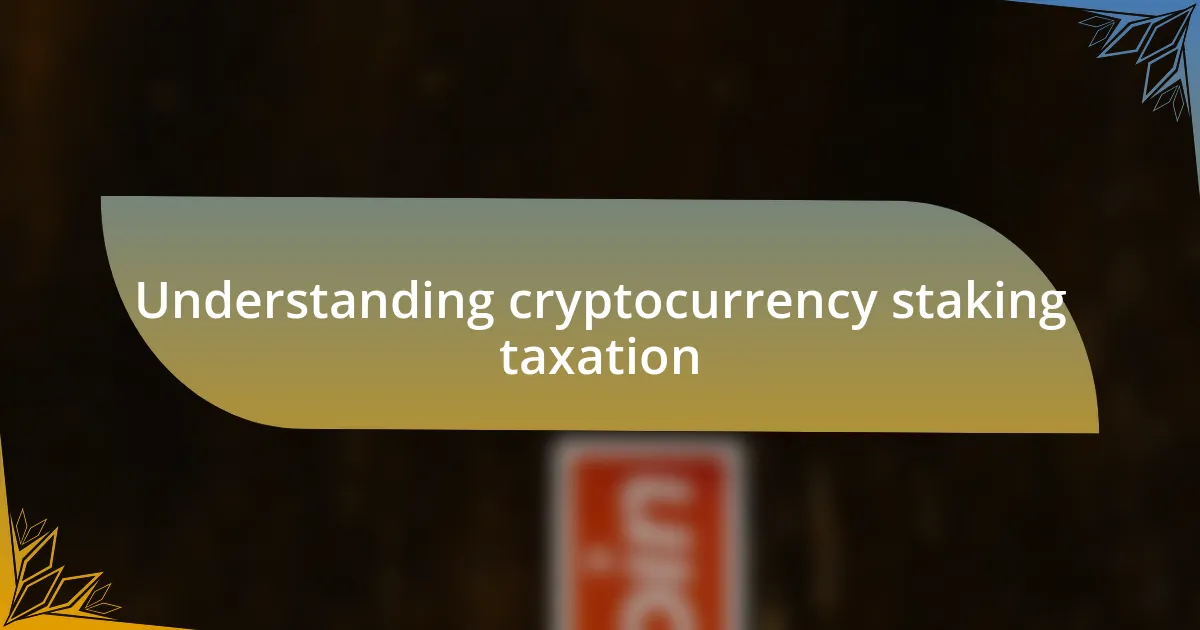
Understanding cryptocurrency staking taxation
Understanding cryptocurrency staking taxation can be a bit of a maze. When I first started staking, I was overwhelmed by the thought of how my rewards would affect my tax obligations. It’s not just about earning crypto; it’s about comprehending the implications that come with it. Are my stakes treated like income?
I remember the first time I received staking rewards, and it felt like a win. However, the excitement quickly turned into concern when I realized I had to report those earnings. It dawned on me that staking rewards are generally considered taxable income in the eyes of the IRS, which means they need to be reported at fair market value on the day I received them. Each reward adds to my overall income, potentially pushing me into a higher tax bracket—something I had to grasp early on to avoid surprises.
Navigating these complexities has made me more cautious about my staking strategies. I often ask myself, “How can I optimize my returns while maintaining clarity on my tax obligations?” I’ve found that keeping detailed records of every transaction is key. This allows me to be proactive rather than reactive come tax season. By managing my records, I feel more empowered, turning a potentially overwhelming task into a manageable and informed process.
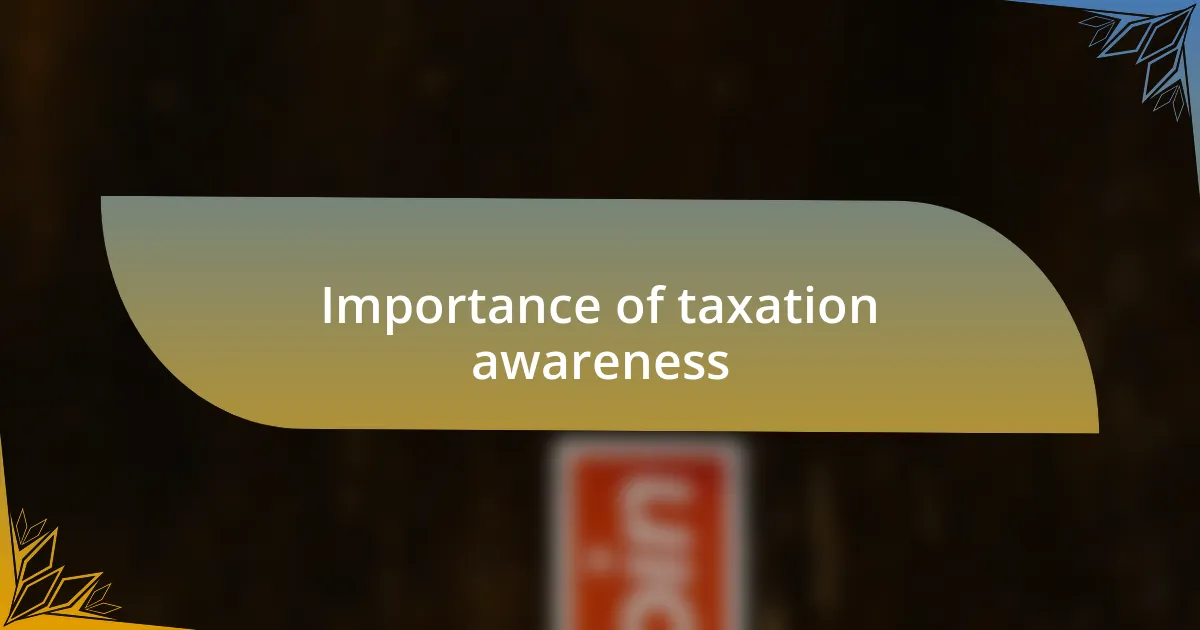
Importance of taxation awareness
Staying aware of taxation in the cryptocurrency space is crucial for anyone venturing into staking. I recall a time when I overlooked the tax implications of a significant staking reward, thinking my stash was just a bonus. That oversight led to an unexpected tax bill that dampened my gains. It taught me that embracing taxation awareness not only safeguards my profits but also enhances my overall approach to investing.
Being mindful of my tax responsibilities has shifted my perspective on staking. The more I learn about how different transactions are taxed, the more strategic I become in my choices. I often ponder, “What will this mean for my financial health down the line?” By considering the long-term tax implications of my staking activities, I feel more in control and less vulnerable to financial pitfalls.
Moreover, there’s a psychological benefit to understanding taxes in this arena. I’ve found that having a clear understanding of what I owe alleviates a lot of stress during tax season. No longer do I dread the paperwork; instead, I tackle it confidently, knowing I can navigate my way through the complexities. Isn’t it empowering to transform anxiety into action? By staying informed, I can continue staking with peace of mind.
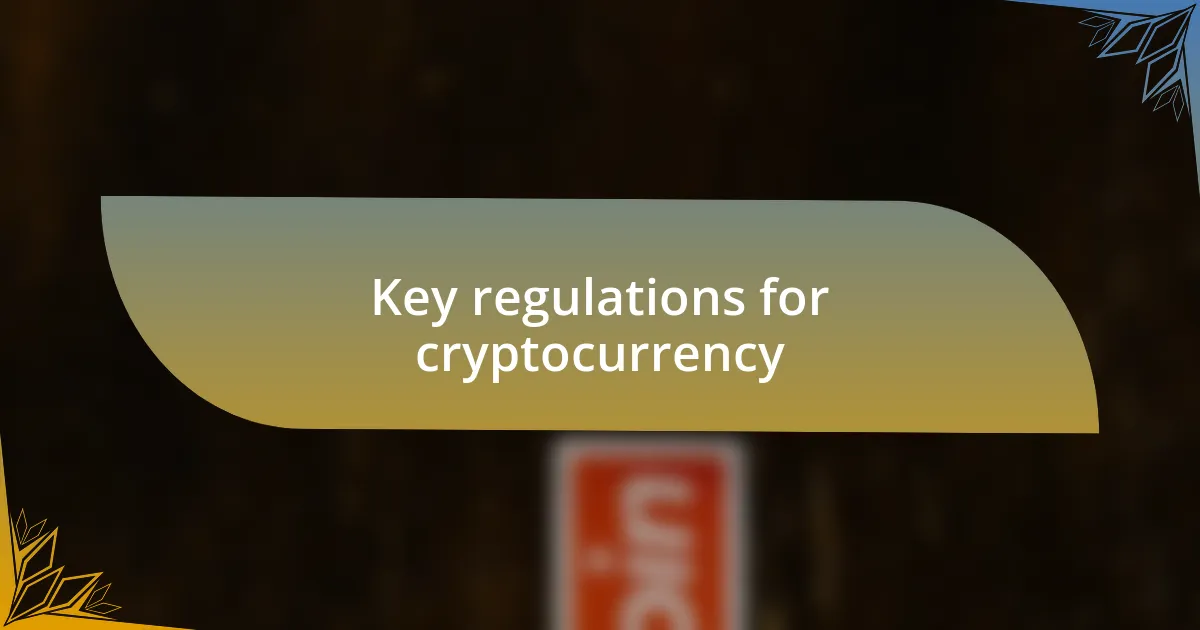
Key regulations for cryptocurrency
Understanding the key regulations surrounding cryptocurrency is essential for anyone involved in this digital asset space. For instance, I vividly remember the moment I stumbled upon the IRS guidelines on virtual currencies. Initially, I was overwhelmed, thinking, “How am I supposed to keep track of all this?!” But once I broke down their requirements on reporting gains and losses, it became clear that being compliant was not just about avoiding penalties; it was about ensuring I had a solid grasp of my investments.
Data shows that many jurisdictions are tightening regulations, especially regarding Know Your Customer (KYC) and Anti-Money Laundering (AML) laws. I once faced a situation with a new exchange that required stringent KYC verification before I could start trading. At first, it felt invasive, but I came to appreciate the process as a layer of security that protects not only the platform but also users like myself from potential fraud. Isn’t it reassuring to know that those regulations are working to create a safer trading environment?
Finally, tax regulations can vary significantly from one country to another. I recall a discussion with a friend who lives abroad; their approach to crypto taxation was entirely different from mine here. This realization struck me—knowing how different laws affect your staking and trading can fundamentally impact your decision-making. Are you in the right jurisdiction for your investment goals? It’s a question worth pondering, as understanding local regulations can make or break your cryptocurrency journey.
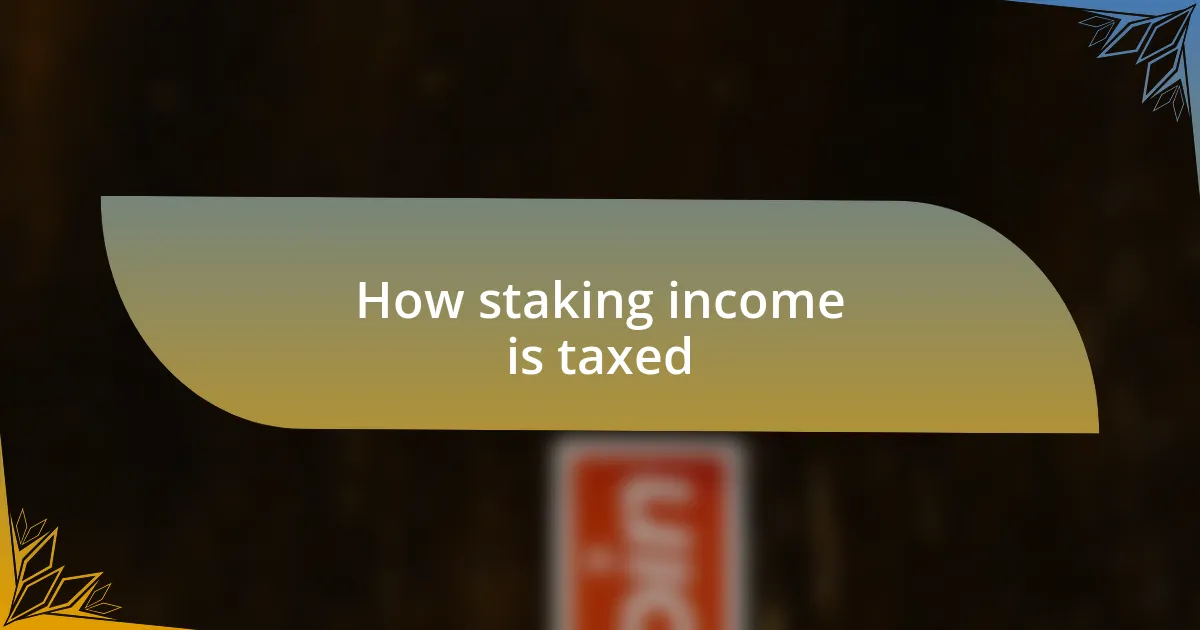
How staking income is taxed
When it comes to how staking income is taxed, I found that the IRS treats it as ordinary income. At first, this surprised me; I expected it to be considered a capital gain, similar to trading profits. It hit me that I’d need to report this income in the year I earned it, even if I decide to reinvest those rewards into more cryptocurrency. Have you ever realized the implications of an unexpected tax obligation? It can certainly take you off guard!
In my experience, the value of the tokens received through staking is determined at the time they are credited to your wallet. This nuance can affect your tax liability; I remember calculating my earnings after a particularly good staking month. It became clear that the fluctuating market price directly impacted my tax burden. If the value dropped significantly by the year’s end, I would still owe taxes based on what I originally received. It’s a fine balance that adds a layer of complexity to financial planning.
Additionally, I’ve learned that some folks might overlook the importance of keeping meticulous records. I’ll admit, I once neglected to track each transaction related to my staking rewards. It became a headache later when I was trying to gather documents come tax season. How did I get myself into a tax scramble? Ensuring accurate records can save you time and stress, as you’ll be prepared for any inquiries or required documentation.

My personal journey with staking
In my personal journey with staking, it all began with a simple curiosity about earning passive income through cryptocurrency. I remember the first time I staked some tokens; the excitement was palpable. Watching my balance grow day by day felt like magic—but I quickly realized that it came with its own set of challenges. Have you ever had that initial thrill turn into an unexpected responsibility?
As I dove deeper into the world of staking, I found myself not just focusing on the rewards, but also grappling with the realization of how market volatility could affect my earnings. There was one month when I received a generous amount of tokens, only to see their value nosedive shortly after. It was disheartening to reflect on how much I had earned, yet still faced a tax obligation based on that higher value. That experience really opened my eyes to the unpredictable nature of crypto—have you ever felt that mix of excitement and anxiety when your fortunes change overnight?
Keeping track of my staking rewards became a lesson in diligence. I distinctly recall a day spent laboriously sifting through my wallet transactions, desperately trying not to miss any token that could alter my tax reporting. It made me appreciate the discipline that comes with crypto trading. How often do we underestimate the importance of organization in the face of potentially stressful tax implications? That day taught me a valuable lesson about preparedness, ensuring I was better equipped for the next tax season.
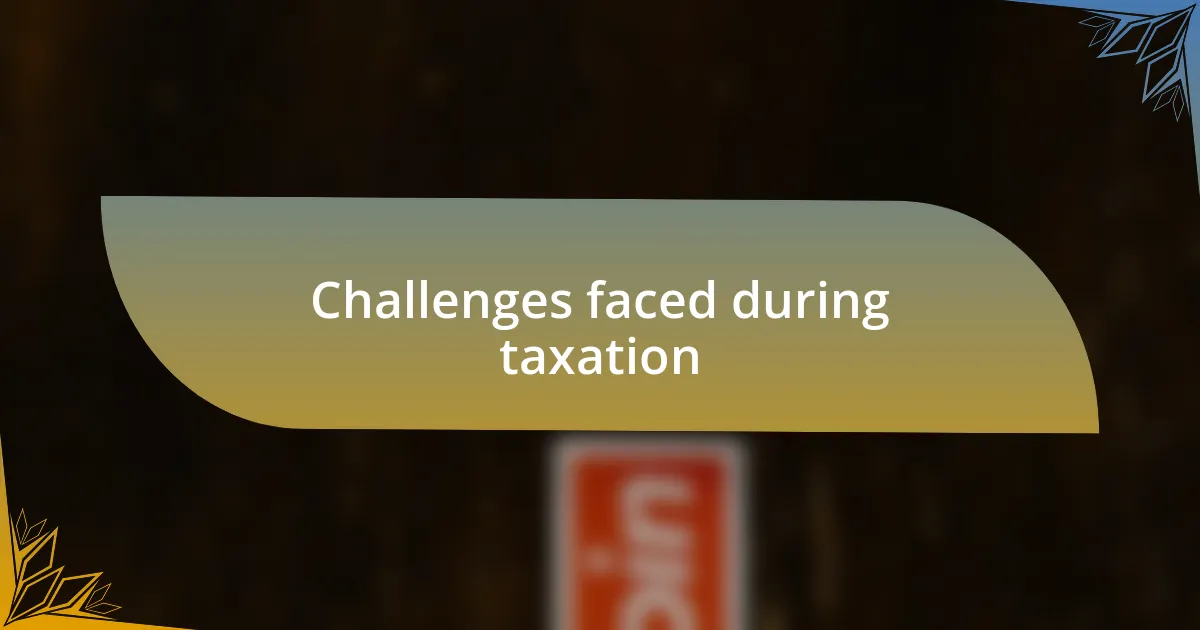
Challenges faced during taxation
As I navigated through the complexities of taxation on my staking rewards, one significant challenge was understanding the varying regulations. It felt overwhelming at times, especially when I discovered that the rules could differ from country to country. Have you ever experienced that sinking feeling of uncertainty when you start questioning whether you’re reporting correctly?
Another hurdle I faced was the difficulty in calculating gains and losses. There were days when I found myself second-guessing my math, particularly when the rates fluctuated dramatically. I distinctly remember one instance where I thought I had everything sorted, only to realize I had miscalculated a recent transaction. Talk about a wake-up call! It reinforced just how crucial meticulous record-keeping is.
Lastly, the emotional toll of potential audits loomed over me like a dark cloud. I couldn’t shake the anxiety knowing that a simple mistake could lead to serious repercussions. I often wondered how many others shared that feeling—was I the only one sweating over tax season? It pushed me to be more proactive with my documents, ensuring that I had everything lined up perfectly well ahead of time.
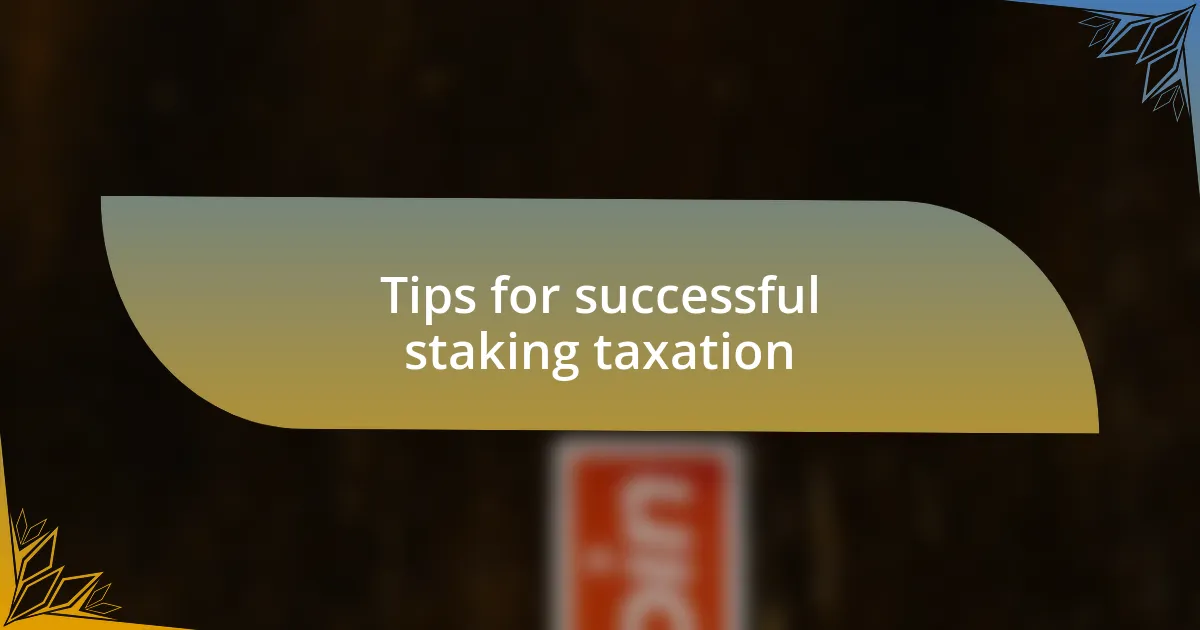
Tips for successful staking taxation
The key to successful staking taxation lies in meticulous record-keeping. I’ve learned firsthand how crucial it is to document every transaction, not just as a habit but as a necessary foundation for managing taxes. It’s tiresome at times, but I often think, “How would I tackle a messy situation later if I hadn’t kept these records?” Taking a few moments after each transaction to update my records pays off when it’s time to report.
Another tip is to stay informed about tax regulations that affect staking in your jurisdiction. When I took the time to read up on recent updates, I found surprises that could have easily caught me off guard. For instance, understanding which coins qualify as taxable events helped me strategize when to claim rewards, potentially saving me from higher liabilities. It’s all about arming yourself with knowledge. Are you current with your local tax laws?
Finally, consider consulting a tax professional who is familiar with cryptocurrency. This was a game-changing decision for me. After a few consultations, I felt more confident navigating the labyrinth of tax obligations that come with staking. I remember my initial reluctance to spend the money, but the peace of mind I gained was worth every penny. Have you thought about how expert advice could clarify your own taxation concerns?